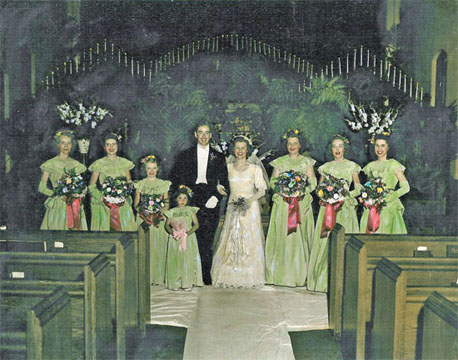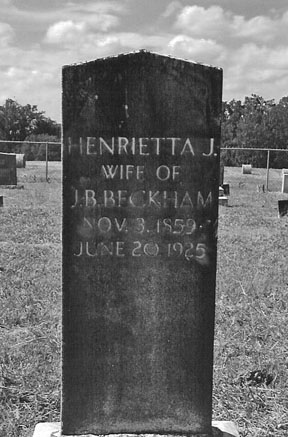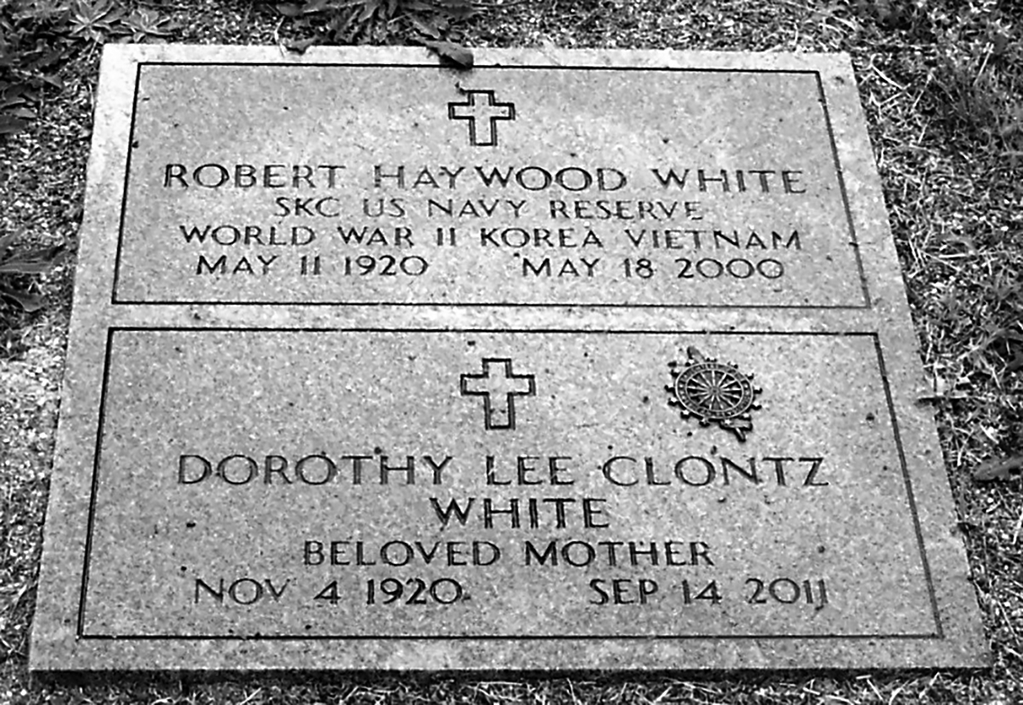Dorothy Lee Clontz White
Dorothy Lee Clontz was born to Robert Luther and Minnie Odessa Beckham Clontz on the 4th of November, 1920 in Charlotte, North Carolina. Dorothy Lee was the kid sister of her brother, Robert Luther Clontz, Jr., who was born in Charlotte six years prior.
 Robert Luther & Minnie Odessa Beckham Clontz in front of their apartment at 1537 South Tryon Street, Charlotte, N.C. in 1941Dorothy Lee’s mother, Odessa, was a character. “Fiercely independent” best describes her; “sassy” just doesn’t cut it. For instance, Robert Luther Clontz was supposed to inherit his parent’s farm in Union County, but Odessa had other ideas. She refused to live anywhere but in the big city—Charlotte. Fortunately, Robert Luther was a skilled master cabinet maker, so the family prospered in the city. Until the Great Depression hit the South earlier than elsewhere in the country.
Robert Luther & Minnie Odessa Beckham Clontz in front of their apartment at 1537 South Tryon Street, Charlotte, N.C. in 1941Dorothy Lee’s mother, Odessa, was a character. “Fiercely independent” best describes her; “sassy” just doesn’t cut it. For instance, Robert Luther Clontz was supposed to inherit his parent’s farm in Union County, but Odessa had other ideas. She refused to live anywhere but in the big city—Charlotte. Fortunately, Robert Luther was a skilled master cabinet maker, so the family prospered in the city. Until the Great Depression hit the South earlier than elsewhere in the country.
No one, not even her eight siblings, dared call Odessa by her first name, “Minnie.”
When skilled labor began to suffer from the economic slide in the South, Robert Luther took jobs where he found them. Between 1926 – 1936, Odessa packed up Dorothy Lee and Robert Jr. and followed her husband to apartments in Mobile, Alabama, Monroe, North Carolina, Richmond, and Newport News, Virginia.
One year, Dorothy Lee was enrolled in three different school systems in three different states. The Newport News schools wanted to hold her back because she entered that system half-way into the school year. However, the principal and the school board had not yet encountered Odessa Beckham Clontz. Odessa won, and Dorothy Lee was not held back. She finished the year, earning distinctions in most of her classes.
Dorothy Lee loved and thought the world of her father. Robert Luther returned from work each night and sat with his daughter to help with her homework and to answer her many, many questions. She was always inquisitive, seeking as much knowledge and understanding from her parents and others as she could glean. Or demand.
 Beta Sigma Phi officer installation (1948)Dorothy graduated with honors from Central High School in Charlotte in 1938. However, college was out of the question. So, she was employed by Southern Bell as an operator where she quickly became known for her skill and dedication. When the country went to war in 1941, she and her fellow operators often worked double shifts to keep communications flowing. With two close friends and colleagues, she was transferred to Charleston, South Carolina in 1943. Dorothy often remarked tearfully on the flotsam from torpedoed ships that washed up on the barrier island beaches there.
Beta Sigma Phi officer installation (1948)Dorothy graduated with honors from Central High School in Charlotte in 1938. However, college was out of the question. So, she was employed by Southern Bell as an operator where she quickly became known for her skill and dedication. When the country went to war in 1941, she and her fellow operators often worked double shifts to keep communications flowing. With two close friends and colleagues, she was transferred to Charleston, South Carolina in 1943. Dorothy often remarked tearfully on the flotsam from torpedoed ships that washed up on the barrier island beaches there.
In late 1944, she left Southern Bell, returned to Charlotte, and quickly found better-paying employment. She reunited with her Southern Bell colleagues and together they planned what was her first vacation. “The girls” took her car and rode the ferry to Washington, D.C.
Dorothy Lee was a great story-teller, by the way.
Odessa stomped her foot and cried “NO!” against this, but her daughter had learned from her mother. Off she went with her friends on The Great Adventure. Or, as anyone who heard her stories, a Series of Great Adventures.
In 1946, she left a terrific job with American Cyanamid Company and married Robert Haywood White. Her husband, although born in South Carolina, was raised in Charlotte. There, he attended the same schools as she, and both families worshipped at the same church. In one of life’s Great Mysteries, however, they did not meet until after he was discharged from the Navy when he was enrolled in Clemson College.
 Robert and Dorothy White wedding (June 1949)Subsequently, Robert White took a job that required him to go to Connecticut for training before going into the field. Dorothy Lee packed and carried their newborn son on a train ‘way up north, negotiated the transfer between stations in New York City, and arrived in Milford as winter struck. It was like her childhood was being replayed, but she was playing the role her mother had earlier.
Robert and Dorothy White wedding (June 1949)Subsequently, Robert White took a job that required him to go to Connecticut for training before going into the field. Dorothy Lee packed and carried their newborn son on a train ‘way up north, negotiated the transfer between stations in New York City, and arrived in Milford as winter struck. It was like her childhood was being replayed, but she was playing the role her mother had earlier.
Another economic downturn meant another job and another move, this time to Atlanta, Georgia. Dorothy Lee was familiar with that city, having opened up a satellite office for American Cyanamid Company there some years before.
Atlanta—actually, South DeKalb County—became their homestead, where they raised their sons—their second child, Robert Edward, was born in 1955. Dorothy raised the boys, kept the home, and worked when she could while Robert Haywood earned a living traveling to sell equipment to textile industry clients in three states. Of course, Robert Haywood helped raise their sons and keep the house, too, but she was there all of the time while he was often on the road.
Dorothy Lee was very active outside the home and in support of her family. She served as a Sunday School teacher, in the neighborhood garden club, and on the school PTA. She and Robert Haywood worked with the boys on their homework and reinforced the principle that their teachers were, like the parents, Always Right. Courtesy and respect for others was demanded and given freely. In the very tumultuous days of the 1960s, Dorothy Lee and her husband never allowed hatred or fear into their home.
 Dorothy & her sons, Don and Ed (1986)As her boys matured through high school, Dorothy Lee went to work as executive secretary to deans at Georgia State University and Atlanta University before moving back to the commercial sector in the 1970s. Major back surgery slowed her down a bit, but not for long.
Dorothy & her sons, Don and Ed (1986)As her boys matured through high school, Dorothy Lee went to work as executive secretary to deans at Georgia State University and Atlanta University before moving back to the commercial sector in the 1970s. Major back surgery slowed her down a bit, but not for long.
Of course, their cruises differed somewhat from those experienced by the boys…
something of which her eldest son never tired of pointing out.
When both of her sons were in the Navy, she decided it was time for her and Robert White to go to sea, too. So, they went off on one cruise after another. Dorothy Lee also found ways to travel—to Israel, England, and Austria, for example.
Dorothy Lee and Robert Haywood separated and divorced in 1981, and she moved herself to Florida. For some, this might be a devastating turn. Instead, Dorothy Lee flowered again.
She first went to work providing residential care to home-bound seniors and then provided care for children of visiting tourists who stayed at the more prestigious hotels in West Palm Beach. She found a new church home and contributed there, as before. She was selected to manage the AARP VOTE project in Florida for the American Association of Retired Persons. And, most significantly, she began what she thought would be a passing interest in her ancestry.
Of course, Dorothy Lee excelled at this and became a remarkably well-known and respected genealogist. Her research proved the existence of not one, but three Patriots of the American Revolution in her family and so she became a very active member in her local chapter of the Daughters of the American Revolution.
 Henrietta Beckham-Emmanuel Cemetery She continued to travel, too. She went on more cruises to the Caribbean, and—in her early 70s—Dorothy Lee traveled to the Peoples Republic of China. When she was home, she managed, for a time, her condo association and spent time with a close coterie of friends.
Henrietta Beckham-Emmanuel Cemetery She continued to travel, too. She went on more cruises to the Caribbean, and—in her early 70s—Dorothy Lee traveled to the Peoples Republic of China. When she was home, she managed, for a time, her condo association and spent time with a close coterie of friends.
In 2001, Dorothy Lee moved to Varina in Henrico County, Virginia to live with her eldest son, but not hardly as a dependent. She quickly became active in her local chapter of the DAR and continued her work in genealogy. She plunged into the World-Wide Web with her own genealogy-based Web site. She never hesitated to call upon her own private, personal Technical Support staff, who would come pounding down the stair and ask: “What now?”
In her last few years, Dorothy Lee was beset by physical and medical issues that make most cringe. She met each with determination and courage and, when her courage seemed to fail, she called upon that reservoir of hope and trust in her faith to sustain her. She insisted upon making all decisions for her care and treatments and set firm plans to help those who would be left when she entered into her new life.
In September, 2011, Dorothy Lee Clontz White, at home and in her own bed, passed peacefully from this life into her Great Family Reunion. Her sons returned her to the red clay of Union County in Goose Creek Township, North Carolina, where her physical remains sleep beside those of her beloved grandmother.
Hers was a vibrant life, a life to be celebrated and remembered fondly and with honor. Whether confronted by adversity or prosperity, Dorothy Lee always held onto her unshakable faith and remembered from Whom she drew support and sustenance.

